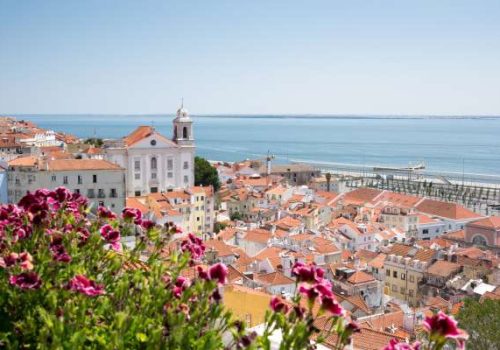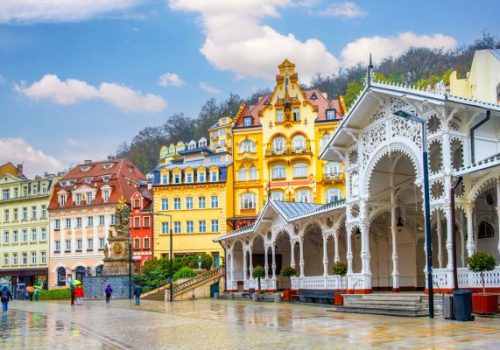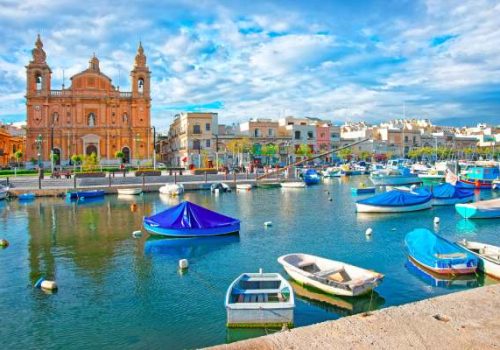Living and working in Riga
Latvia’s capital is also the largest city among the Baltic countries and the most important harbour. Riga was first populated by a group of people called the Livers, who were a Baltic Finnish people. The Livonians were involved in trade, fishing and cattle breeding. In the Middle Ages, Riga was an important destination for trade with the Vikings, who also used the city to reach various Russian territories and to get to the Black and Caspian Seas. German merchants also began to circulate in the area around the city and interest in introducing Christianity to Riga led to German missionaries being sent there.
Bishop Albert of Riga arrived in the city in the early 13th century, from Bexhövede in northern Germany, and moved the episcopate here. This event is credited with founding the city of Riga itself, as the bishop had a fortification built around the city to protect it from attack. The Order of the Knights of the Sword was also founded by the bishop and, after some resistance, succeeded in defeating the Livonians living in the area. Under German rule, the city expanded and took up trade with Visby and joined the Hanseatic League, becoming Protestant thanks to Martin Luther’s ideology.
In the 17th century, the Swedish army, led by Gustav II Adolf, tried to conquer the city and succeeded. For almost 100 years Riga was under Swedish rule and it was during this time that conditions for Latvians improved with the privileging of Latvian culture and language.
In 1710, the Russians took over Riga and by the beginning of the 19th century, the city had the most important port in Russia and the industrialisation of Riga took off. The city began to expand, building boulevards and parks. Both the Riga Opera and the National Theatre were also established at this time.
Both world wars took a heavy toll on the city and many of Riga’s Jews were deported and killed. After the Second World War, the country of Latvia, and thus Riga, was united with the Soviet Union until 1991. During this time, the city industrialised and many of the Soviet Union’s electronic equipment was manufactured in Riga. Many Latvians were imprisoned and sent to labour camps in the Soviet Union, while the Russian population of Riga grew. In 1991, Latvia finally gained its independence following the coup in Moscow. Today, Riga is Latvia’s main industrial city, accounting for more than 50% of the country’s exports, and the port of Riga is one of the largest in the Baltic States. Even today, more than 50% of the population is Russian.
Latest job openings in Latvia
We can’t find any jobs that match your search. Below you will find some of our most sought-after positions!
- Customer support
- Latvia
- Customer support
- Portugal
- Customer support
- Czechia
- Customer support
- Portugal
Fun facts about Riga
Language: Latvian
Currency: Euro
Capital: Riga is the capital of Latvia
Population: 625,000 inhabitants
Known for: Europe’s largest food market, Art Nouveau buildings and the world’s first Christmas tree.
Good to know: Riga has some of the fastest internet in the world and you can access free wi-fi in most places.
Working in Riga
As a Swedish citizen, you don’t need a work permit to work in Riga. You can look for jobs in advance by searching online on various job portals such as LinkedIn or Careerjet, or by contacting various online recruitment agencies such as WorkingDay and Enjoy recruitment. Many job positions do not require you to speak any Latvian and the whole interview and work process is carried out in English, but if you want to live and work in Riga for a longer period of time, it might be useful to learn some simple phrases and words to communicate better with people here.
Most job vacancies can be found in the IT, customer service or financial sectors. In the workplace, it is best to avoid talking too much about personal matters or asking questions about family. The work environment tends to be based on hierarchical structures and it is common to consult managers and other colleagues before making a decision yourself. Some major international companies present in Riga are Deloitte, Swedbank, Tele2 and Accenture. You can send your CV together with a cover letter directly to these companies. A probationary period of 3 months is normal when you start working in Riga. The notice period is usually 1 month unless otherwise mentioned in the employment contract.
Working conditions in Riga
A normal working week is usually 40 hours, 5 days a week. It is common to work overtime, but no more than 144 hours in 4 months by law. You are also entitled to 4 weeks paid holiday in a year, and women working in Riga are entitled to 3 months maternity leave.
Salaries in Riga
The average salary in Riga in 2021 is around €850 net per month.
Income tax in Riga
The Latvian tax system has a progressive tax rate ranging from 20% – 31.4%. In addition to income tax, various social security contributions are also deducted from your salary. These amount to 11%.
Popular jobs in Riga
The Latvian capital has enjoyed steady economic growth since Latvia joined the EU in 2004. In recent years, Riga has become an important city for expats working in IT, sales and customer service. The Latvian capital has also been dubbed ‘The Smart City’ thanks to the economic growth that took place in 2014. You can work in tourism, transport, industry and retail.
Finding a job in Riga
It is not very difficult to find a job in Riga, especially if you have a degree in IT and programming, or if you speak several languages.
For various job openings in Riga, you can keep an eye on our website as we regularly update it with different vacancies. Other good sites for finding jobs in Riga are these:
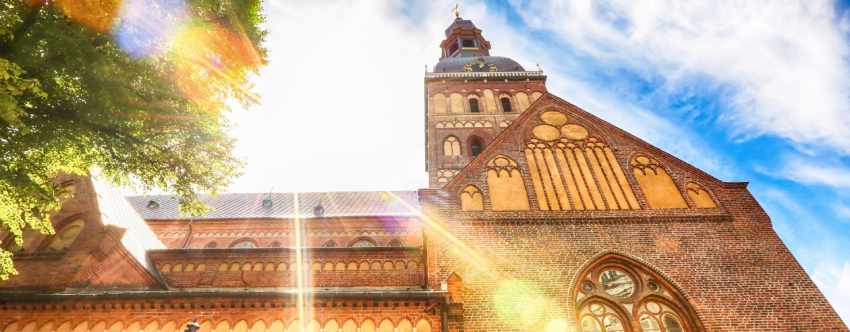
Looking for a job in Riga
Looking for a job in Riga is an opportunity for many people seeking a new challenge or a change of lifestyle. Riga, the capital of Latvia, has grown into one of the most dynamic and international cities in Eastern Europe. The city is known for its vibrant nightlife, beautiful architecture and growing technology and business sector.
There are many ways to search for jobs in Riga, from using online platforms such as LinkedIn and Indeed to visiting local recruitment agencies or attending job fairs. You can also contact companies directly to see if they have any vacancies.
When looking for a job in Riga, it is important to be prepared to face competition. The city has a growing population and a strong economy, which means there are many applicants for available jobs. To stand out among applicants, make sure you have a well-developed CV and a strong personal presentation.
It can also be helpful to have a good knowledge of the local language, as this is an advantage in differentiating yourself from other applicants. In addition, it is important to be aware of cultural differences and follow good work etiquette when applying for a job in a new city.
Applying for a job in Riga can be an exciting and challenging experience. By preparing yourself and showing your strengths, you can land your dream job and experience all that this beautiful city has to offer.
Networking in Riga
Riga, the vibrant capital of Latvia, has a rich network for people looking to make new friends and professional contacts. Known for its vibrant nightlife and unique cultural opportunities, there are many ways to meet new people and expand your network.
For those looking to make new friends, there are many social events specifically designed for this purpose. These include everything from trivia nights and game nights to wine tastings and pub crawls. In addition, there are many social media groups that are specifically geared towards bringing people together for social interaction, such as Meetup and Facebook groups.
For those looking to make professional contacts, there are also many opportunities in Riga. The city is home to a variety of businesses and organisations, and there are many networking events specifically designed to enable contacts in specific industries. These include everything from trade fairs and conferences to networking happy hours and other gatherings.
It is also important not to underestimate the value of networking in person. Real-life meetings and conversations can often lead to more personalised and long-lasting connections than networking on social media or at events.
If you’re looking to expand your professional network in Riga, take a look at these websites:
Whether you are looking for new friends or professional contacts, there are many opportunities in Riga to expand your network. You just have to be willing to take the initiative and participate in activities that suit your interests and goals. So start networking today and expand your network in Riga!
Living in Riga
Riga is a popular destination for younger people as there is plenty to do, plus the city is still relatively cheap. The beautiful nature of Latvia, which is largely untouched, is another important reason why the country and its capital Riga have become popular with many young people and tourists. In summer, there are also many beautiful beaches to visit and many national parks where you can admire the beautiful nature found here. The inhabitants can be a bit withdrawn, but they are generally helpful and friendly, and many of the inhabitants of Riga also speak English. A negative aspect of living in Riga is the cold and dark winter months as well as bad weather during certain months of the year.
Advantages of living and working in Riga
One third of Latvia’s population lives in Riga, which means that the city is always busy and there is always something to do.
Other benefits of living and working in Riga can be found here.
One of the fastest internet connections in Europe
If you work from home or need a fast connection, you’ve come to the right city. As well as providing residents with a fast connection, it’s also free in many places and neighbourhoods around the city.
Young and vibrant city
As well as being a UNESCO World Heritage Site, Riga’s Old Town is full of restaurants, pubs and bars. It also has a number of museums and if you like classical music and opera? Well, you’ll be pleased to know that tickets to the theatre or opera are relatively cheap and available all year round.
Cheap capital city
Compared to other cities in Europe, Riga is a cheap city to live in. You can easily find good and nice accommodation that doesn’t cost too much to rent but also go out to eat for a cheap price.
Beautiful nature
The nature in Latvia is magnificent and just a stone’s throw from the capital Riga you have a variety of national parks, beautiful beaches and an endless number of forests to help you recharge your batteries for a while. Riga also has a number of parks that will give you the chance to escape the city and breathe in some fresh air, even if it’s just for half an hour.
Working in IT
New IT companies are constantly opening up in Riga, so if you have a qualification in this field you should have no problem finding work here. Other sectors on the rise include customer service, finance and tourism. Riga is also a popular city for digital nomads , who thrive on the low costs and fast internet connection.
Living in Riga
There are plenty of apartments available in Riga, but finding one that suits you can be a little trickier. The first thing to do is to ask yourself what you think is most important between:
- distance to the centre
- furnished or unfurnished apartment
- neighbourhood
- the size of the apartment
A good tip is to first find a short-term accommodation to explore the city better and then look for an apartment on the spot. You can look for apartments on these websites:
If you are unsure of how to proceed and do not have enough time to look for an apartment yourself, you can always contact an agent or a broker specialised in renting apartments for foreign residents or tourists. They can also help you with all the documents needed to sign the contract. Usually, electricity, water and gas are not included and are paid separately. These costs are usually between €60 and €100 per month, but always check carefully in advance what is or is not included in the monthly rent. The cancellation period is usually 30 days unless otherwise stated in the rental agreement.
A one-bedroom apartment in the centre of Riga will cost you between €300 and €500 a month. If you are content to live on the outskirts of the city and then commute into the centre, the price goes down a bit and you can save some money.
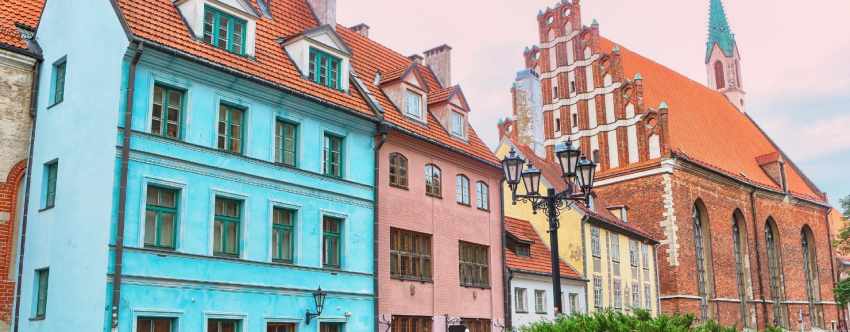
Transport i Riga
Bor du i Riga så kan du ta dig runt i staden med hjälp av buss eller spårvagn. Annars går det också bra att gå till fots om du tycker om att motionera samtidigt som du upptäcker delar av staden och njuter av utsikten. Det finns även en buss som går direkt ut till flygplatsen – nummer 22 – som sedan också tar dig tillbaka till stadens centrum. Hela resan tar cirka 30 minuter. Du kan köpa biljetter i tidningskiosker som finns runt om i staden, eller i de olika automaterna vid hållplatserna. En enkelresa kostar 1,15 €.
Äta i Riga
Lettland är kanske inte mest känt för sitt kök men det finns en del lettiska maträtter som du absolut måste prova om du lever och jobbar i Riga. Det lettiska köket har många spår av grannländer som Polen, Ryssland, Tyskland och även Sverige med maträtter som piroger, rödbetssoppa och surkål. På senare år har många nya gourmetrestauranger också öppnat upp i staden, och är du öppen för nya kulinariska upplevelser får du inte missa dessa matställen om du bor i Riga.
Vincents
En av stadens bästa restauranger som ligger i ett fint kvarter i närheten av många ambassader. Här har kändisar som Prins Charles, Elton John och George W. Bush ätit, och här serveras också endast färska råvarorna som odlas enbart för restaurangen. Menyn är säsongsbetonad och ändras varje månad. Här kan du äta alltifrån traditionella lettiska maträtter i modern tappning till japanska- och italienska maträtter.
Kalku Varti
Restaurangen har en säsongsmeny som återspeglar landets olika råvaror som kött, fisk, svamp och olika bär. Restaurangen befinner sig i ett historiskt kvarter och byggnaden den ligger i är från 1700-talet.
Milda
Här kan du äta lettiska maträtter lagade i modern tappning. Restaurangen har även en imponerande vinlista, och missa inte deras soppa med karljohansvamp som serveras i en stor brödfralla med torkade blåbär.
Gå ut i Riga
I Gamla stan i Riga har du många pubar och barer att välja mellan när du startar din kväll i staden. Det finns fortfarande spår av tiden under Sovjetunionens styre men viljan och längtan efter självständighet har bidragit till att ett flertal diskotek och nattklubbar öppnats upp sedan början på 1990-talet. Även den lettiska operan och en hel del parker som bjuder på livemusik, har bidragit till att folket har börjat att gå ut och njuta av lettiska traditioner som blandas med västerländska.
Missa inte dessa lokaler om du lever och jobbar i Riga.
Cynic Bar
Baren ligger centralt och serverar annorlunda cocktails. Härlig stämning och kitschig inredning är det som gäller här.
Gauja
I denna baren kan du få en inblick i hur livet såg ut i Riga på 70-talet under kommunisttiden. Inredningen, och till och med glasen, kommer från det gamla Sovjetunionen.
La Rocca
Lokalen anses vara den bästa i Riga och på helgerna har du möjligheten att dansa med runt 1500 andra entusiaster. Här anordnas också olika temakvällar och uppträdanden.
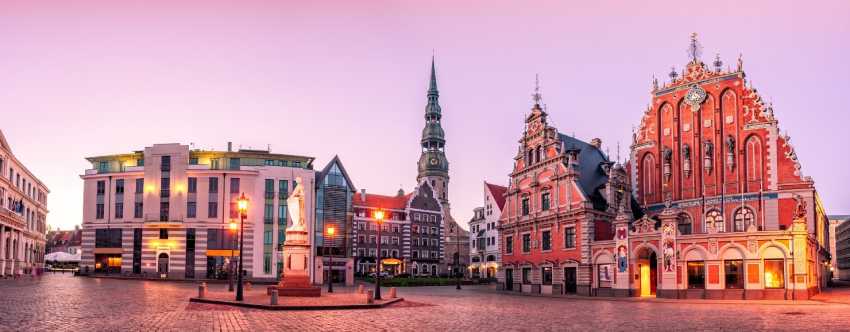
Cost of living in Riga
The cost of living in Riga varies depending on the lifestyle you choose and what you need and want. But in general, the cost of living is quite reasonable compared to other European capitals. For example: The cost of living in Riga is 46% cheaper than in Stockholm.
Rent for an apartment in the city centre is usually between 4,000-7,000 SEK per month, while an apartment of your own can cost as much as 10,000 SEK per month. Food prices are reasonable with a meal at a budget restaurant costing between 50 – 100 SEK. However, if you want a fancier dinner in a restaurant, expect to pay between €200 – €300 per person.
Transport costs are also reasonable, with a monthly public transport pass costing around €350. However, if you prefer to rent a car, you can expect to pay around €4,000-5,000 per month.
For those who want to shop and treat themselves, there are many opportunities in Riga, but it can also be quite expensive. Prices for clothes, shoes and other goods are similar to other European countries.
Landscape and nature in Riga
The city is located right on the Gulf of Riga with the Daugava River flowing through the city and emptying into the Baltic Sea. Riga has a humid continental climate with cold and windy winters but mild and rainy summer days. Heavy rains are also common in autumn and there is a lot of fog.
Climate in Riga
Riga has a temperate climate with cold winters and mild summers. The average temperature during the winter months is around -5 degrees Celsius while summers have an average temperature of around 17 degrees Celsius.
During the winter months, it is common for it to be cold and snowy with many cold winds from the east. These winds often make it really cold, especially in the eastern part of the city. The snow often stays for several weeks during the winter months.
Summer in Riga is very mild, with temperatures often rising to over 20 degrees Celsius. During this time there is a lot of sunshine and rarely rain. Many people visit the city during the summer months to enjoy the warm weather and the beautiful nature that surrounds the city.
Despite the temperate climate, Riga is a beautiful and lively city all year round, with many cultural events, restaurants, cafés and bars to visit.
What not to miss in Riga
Riga has become a popular destination in northern Europe in recent years, with many low-cost airlines flying to the city daily. Here you will be greeted by Art Nouveau architecture mixed with old buildings from the communist era. Walk around the Old Town and visit the Riga Central Market to see what the day’s catch of fish has brought. On your way back, you can also stop by the largest flower market in the Baltic States near Vermanes Park and admire all the flowers and beautiful colours. Then stop for a while in the park to relax and enjoy all the marvellous sculptures.
Don’t miss these places if you live and work in Riga.
The three brothers
Three old buildings located in the Old Town of Riga that are from different eras. The oldest building dates back to the 15th century and is characterised by Renaissance and Gothic architecture. Today, the Museum of Latvian Architecture is located inside the three buildings and the place is definitely a favourite for that perfect Instagram picture.
World of Hat
A museum with a difference where you can see hats and other artefacts from around the world. You can also see how different cultures from around the world are characterised by different hats, and how they were used.
Art Café Sienna
A must if you are visiting the Art Nouveau neighbourhood. When you step into the café, you’ll feel like you’ve travelled back in time – to the 1920s or something similar. Coffee and tea along with delicious pastries are served by well-dressed waiters with white gloves. Extremely expensive – yes – but you won’t regret it.
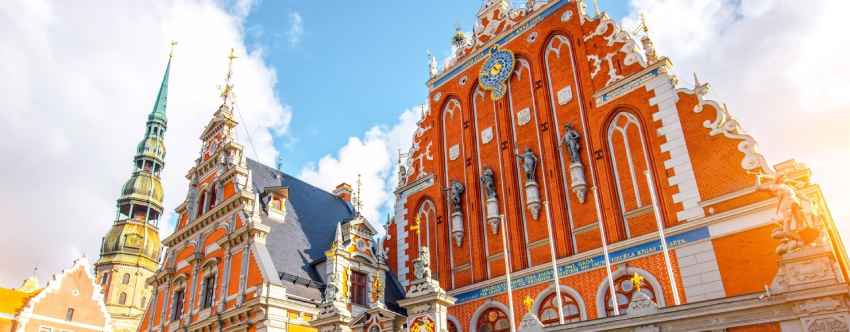
Health care in Riga
The standard of healthcare in Riga and Latvia is relatively good, and if you need to see a doctor while you are there, you should preferably use a doctor who has a contract with the Latvian National Health Insurance (NVD). As a rule, you will only pay a co-payment. The same applies if you need to see a specialist. The only difference is that the excess for a visit to a specialist is slightly higher than that for a visit to a general practitioner. Ambulance transport is free only in case of emergency.
Visa and travel insurance in Riga
EU nationals are entitled to stay in Riga for more than 3 months without having to apply for a visa or residence permit. However, if you want to live and work in the city, you will need to register and apply for a residence permit with the Migration Board and obtain a personal identity number from the Tax Office.
It is advisable to take out additional travel insurance if you want to live and work in Riga. Repatriation to Sweden in case of specific accidents or illnesses is not covered by the Social Insurance Institution or the European Health Insurance Card.
Safety in Riga
Riga is a safe city to live in, but you may want to pay a little attention in large crowds and on public transport. Pickpockets tend to roam around all the tourist attractions, and there have been cases of people having their belongings stolen from their cars. Riga is also a safe city for women going out or travelling alone.

